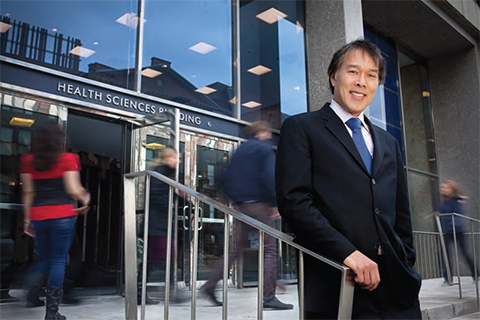From the moment he arrived on campus a little more than a year ago to become director of the Dalla Lana School of Public Health, Dr. Howard Hu believed the school had the potential to rank among the world’s best. Its faculty members are leading experts on tobacco, air pollution and occupational disease, among other areas, and they attract more than $30 million annually in research funding. And with Toronto’s diverse population, Hu saw an opportunity for the school to adopt a truly international perspective – one of many features to distinguish it from other top-ranked institutions.
This past July, the Dalla Lana School became U of T’s newest faculty – a move that Hu, who is now its founding dean, says will position it better to compete with the world’s leading schools of public health and help attract the best students and professors. “It shows we have an institutional commitment to public health, a critical mass of researchers and a clear, strategic plan,” he says. His goals include expanding student enrolment to meet a rising demand for public-health professionals, recruiting new faculty, inaugurating new research programs and creating new senior leadership positions.
Hu, who came to U of T from the University of Michigan, is a physician-scientist and an expert in environmental epidemiology. He is particularly interested in building the faculty’s strengths in three overlapping areas of scholarship: healthy cities, global health and the integration of public health with primary-care medicine.
He believes Toronto serves as an excellent model for a “healthy” city in terms of walkable neighbourhoods, easy access to fresh fruits and vegetables, healthy work environments, comparatively low air pollution and community-based partnerships for health. He hopes the school will find ways to translate these conditions to other parts of the world – and that it will learn from other cities as well.
The Dalla Lana School’s reputation in global health stems primarily from the work of its faculty, who are conducting research into important health challenges in low-income countries and promoting greater health equity internationally through research, analysis and the creation of relatively low-cost innovations. Hu wants to build on these strengths.
He describes his third priority as designing the “sustainable health-care system of the future.” What will be crucial, he says, is developing effective prevention strategies that keep people healthy for longer. “For years, medicine has emphasized treatment. In fact, investing in prevention is where the biggest payoff s are likely to be,” he says.
Many of the faculty’s strengths are grounded in its history. The University of Toronto’s School of Hygiene began in the 1920s as one of the first three public-health schools created by the Rockefeller Foundation. (Harvard and Johns Hopkins were the others.) It quickly became a leader in public-health issues of the day: vaccinations, sanitation, nutrition and epidemiology.
Then, says Hu, funding dropped away. Universal health care came to Canada, and it seemed as though immunizations and antibiotics might solve the most pressing public-health problems. The university disbanded the school in the 1970s, only to re-establish it three decades later, with the help of a $20-million gift from entrepreneur Paul Dalla Lana.
“It wasn’t until 2003 and SARS that people saw the urgent need for a co-ordinated approach to public health,” says Hu. “And U of T, which is right at the geographic, political and institutional nexus of public health, is the ideal home for a place like the Dalla Lana School.”







No Responses to “ Public Health Gets a Promotion ”
Great article I really appreciate it; thank you for sharing it.